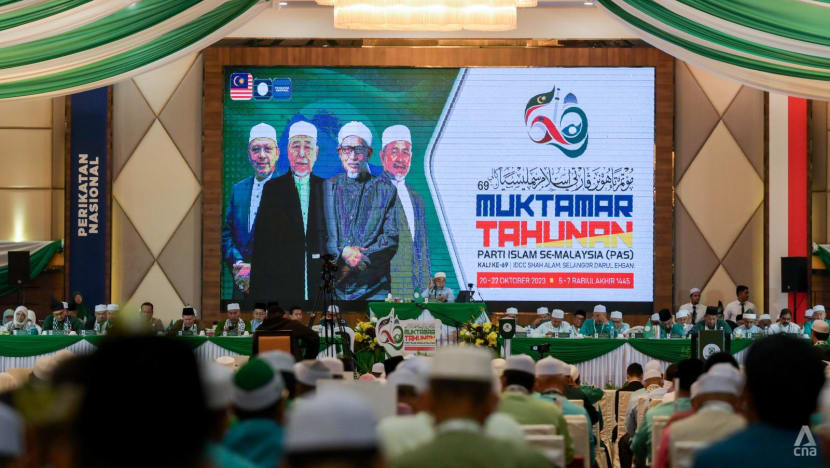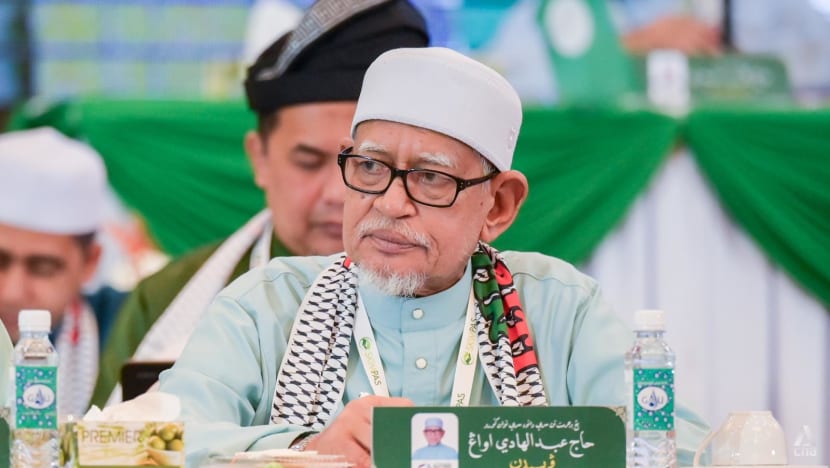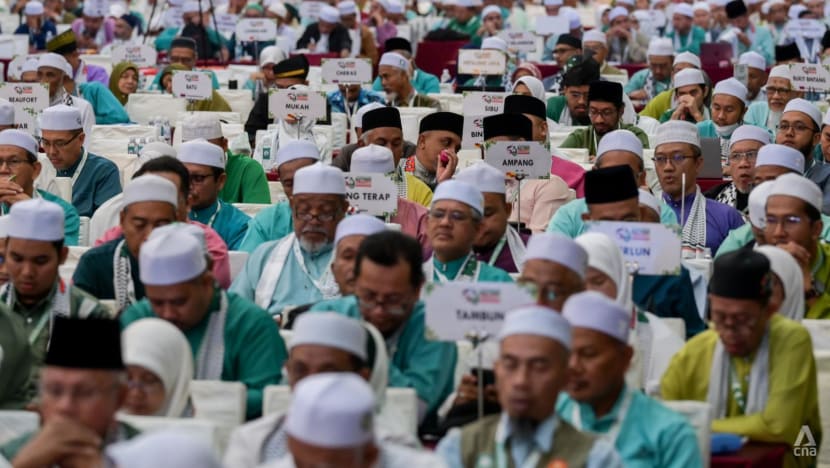'Seeking more honey': Why Malaysia's Islamist party PAS wants to woo non-Muslim voters
With an eye on being in the federal government after Malaysia’s next general elections, the opposition Parti Islam Se-Malaysia (PAS) has realised it cannot only rely on the Malay vote. But analysts say it faces big challenges in courting non-Muslim voters.

Delegates from all over the country gathered at Parti Islam Se-Malaysia's 69th annual congress in Shah Alam, Selangor on Oct 21, 2023. (Photo: CNA/Fadza Ishak)

This audio is generated by an AI tool.
KUALA LUMPUR: The goal set by Malaysia’s opposition Parti Islam Se-Malaysia (PAS) in winning over the non-Malay, non-Muslim voters by the next general election reflects its ambition to return to power, though achieving it will be an uphill task, say analysts.
Those interviewed by CNA say the biggest stumbling block for the Islamic party lies in its “extreme” image among most non-Malay and non-Muslims in the country, stemming from the religious-based rules it implements in the states it governs.
To raise its chances of success with its new goal, PAS will need to strike a more moderate tone, though this could risk diluting the party’s brand of politics and use of religion that has brought it success in recent elections, say analysts.
“They face a big stumbling block to win the hearts and minds of the non-Malays because they also know the importance of the Malay vote. You can appease the Chinese and Indians but run the risk of offending the Malays,” said political analyst Jeniri Amir, a senior fellow with the National Professors Council.
Observers were responding to remarks made by PAS president Abdul Hadi Awang at the opening on Friday (Oct 20) of the party’s three-day annual congress where he said it needed to work on winning over non-Malay and non-Muslim voters if they were to make greater inroads at the country's 16th general election (GE16).
“In the recent GE-15, we successfully garnered the support of Malay Muslims voters. Therefore, a pivotal and weighty endeavour must be done to secure the support of non-Muslim and non-Malay voters in the upcoming GE-16. This undertaking demands diligent, well-organised, and astute implementation and discussion,” Mr Abdul Hadi said in his speech.
"We did a post-mortem and we found weaknesses and strengths ... among the weaknesses were our failure to get voters who are not Muslims and the insufficient number of seats.”
PAS’ annual congress is taking place after the party’s largest-ever successes in its history, positioning it as the principal party for the Malays in Malaysia in place of the United Malays National Organisation (UMNO).
PAS’ performance was relatively stable from the 12th to the 14th general elections, but during the 15th general elections in November last year, it managed to increase their share of seats in the parliament by 140 per cent to garner 43 seats.
It became the single-largest party in Malaysia's parliament with the result, with Mr Hadi Awang calling it “a significant milestone” in PAS’s 71-year history and attributing it to the party’s collaboration within the Perikatan Nasional (PN) coalition.
The PN – made up of PAS, Parti Pribumi Bersatu Malaysia (Bersatu) run by former premier Muhyiddin Yassin, and Parti Gerakan Rakyat (Gerakan) – have a total of 73 seats in the 222-seat parliament, although Gerakan doesn’t hold any.
Fuelling fears of a “green wave” sweeping across Malaysia - green is associated to PAS with its flag being in the colour - the Islamic party put in an improved showing again at the local elections in six states in August.
It contested 126 out of 245 seats and won a total of 105, helping the PN coalition to make significant inroads in the state assemblies controlled by the ruling Pakatan Harapan coalition and Barisan Nasional (BN).
PN won 22, 11 and five seats in the PH-run states of Selangor, Penang and Negeri Sembilan respectively. Of these, PAS won 10 seats in Selangor, seven in Penang and three in Negeri Sembilan.

“EXTREME” IMAGE
While Malays are the majority in Malaysia, making up just less than two-thirds of the population, coalitions that want to be in power also require non-Malay votes to achieve their aims, say analysts.
But observer Dr Jeniri said that PAS was not only rejected by the non-Malays but also the Bumiputera in Sabah and Sarawak, the majority of whom are Christian.
He said that the party does not have any significant grassroots in Sabah and Sarawak.
“It is difficult for them to win these votes because they are perceived as extreme,” he told CNA.
“Many times its focus is on banning the sale of alcohol or on dressing. All these send the wrong signals to non-Muslims,” he added.
In the four states that PAS’s controls – Kelantan, Terengganu, Kedah, and Perlis – gaming and lottery outlets have been banned, although Perlis will only implement the ban next year.
PAS’ image hasn’t been helped after it was reported recently that the Terengganu state government had banned women from competing in gymnastics events since last year because of concerns over attire.
It was reported that several of Terengganu’s women’s gymnasts who were supposed to compete in the 2024 Malaysian games were offered spots in the Wushu team instead.
In Kelantan, the state government has barred movie theatres in the state for the fear that it would promote vice. The ban came into effect after PAS took over BN as the state government back in 1990.
A report by Malaysia’s Centre for Independent Journalism (CIJ) found that (PAS) and its president Abdul Hadi played up racial rhetoric the most during the 15th GE.
The study said Mr Abdul Hadi had pushed anti-Chinese sentiments through negative social media posts against the Democratic Action Party (DAP), and that he had called its fielding of Malay candidates a “dangerous and slick move”.
Dr Awang Azman Awang Pawi of Universiti Malaya said as long as PAS was “unfriendly” to non-Muslims, it would be tough for them to spread their wings.
“The main problem with PAS is they use religion and ethnicity to gain votes and show prejudice towards others. So, it will be tough to win the non-Malay votes,” he said.
Mr Abdul Hadi in his Friday speech claimed that in the states governed by them, the party had always demonstrated religious freedom for followers of other faiths and that places of worship are preserved, while economic activities are unimpeded.
“Nonetheless, the success of PAS, in collaboration with Perikatan Nasional, in governing the states are often viewed negatively because of PAS’s adherence to Islamic principles,” he said, adding that they had to counter the Islamophobic narrative that exploits the ‘green wave’ label to alarm non-Muslims.
RULING COALITION NOT NECESSARILY WORRIED
Analysts, however, also pointed out that when PAS was in the Pakatan Rakyat coalition together with Parti Keadilan Rakyat (PKR) and the Democratic Action Party (DAP) from 2008 to 2015, it had no problems getting votes from the non-Muslims.
The PR coalition contested in the 12th general elections in 2008 as a coalition for the first time, denying BN a two-thirds majority in the parliament for the first time ever in its history.
PR made further ground in the 13th general elections in 2013 before breaking up in 2015 over disagreements over policies, including calls for the implementation of the Islamic penal code in Kelantan.
Political analyst Dr Sivamurugan Pandian of University Sains Malaysia (USM) said that PAS had DAP and PKR to help them play a feeder role to win the non-Muslims votes before, but doubted its current PN partner Gerakan could play the same role.
Mr Abdul Hadi said in his speech on Friday that Gerakan had the duty of attracting support from non-Muslim voters within the PN government.
He said that while Muslims are prohibited from pledging their ultimate allegiance to non-Muslims, yet they are permitted to engage in cooperation and other less binding affiliations without transgressing the principles and boundaries of the Islamic struggle.
Dr Pandian however pointed out that Gerakan president Dominic Tan lost in the Penang state elections despite contesting in the majority Malay seat of Bayan Lepas in Penang.
The local PAS branch there had protested the decision, saying that the seat should have been contested by a Malay candidate as it was a Malay majority seat.
“This just raised questions about PAS’ sincerity in working with Gerakan, so non-Malays would still be wary of them,” Dr Pandian told CNA.
Dr Awang Azman said that Gerakan wasn’t up to the job and that the non-Malays had the choice of PKR and DAP to vote for.
“The party is seen as not having a dynamic leadership while the issues they raise are not clear or bold. I don’t think that PH is necessarily worried about Hadi’s statement because it was just political rhetoric,” he said.
Dr Awang Azman also believed that PAS would not change its religious-focused outlook as long as Mr Abdul Hadi was still in charge of the party.
“Maybe once his era is over, the new leadership would be able to realise that without the non-Muslims, they wouldn’t be able to take over the government,” he said.

CONGRESS WILL BE ONE TO WATCH
With PAS’ electoral gains and being the single party with most seats, the three-day congress - its 69th since its inception in 1951 - is expected to chart out the future of the party, believe observers.
There will be no changes among the top leadership of the party as there were no contests for the top five positions for the 2023-2025 term.
Still, Ms Bridget Welsh, an honorary research fellow of the University of Nottingham Malaysia's Asia Research Institute, said the congress was an important one to watch following Prime Minister Anwar Ibrahim’s invitation earlier this month to PAS to join the PH-BN unity government.
“PAS is unlikely to take up Anwar’s offer as it is quite comfortable where it is (for now): growing in power and the dominant player in the PN coalition,” wrote Ms Welsh in an article on her website on Friday.
“Nevertheless, PAS’ eagerness and ambitions to return to the federal government are ever apparent. PAS leaders have learned that being in the federal government is a step toward gaining even greater influence.”
She added that while the congress has traditionally been about the party and internal debates, this time the party will have to move beyond itself.
“As PAS is now dominating the political centre, the meeting will have greater attention and greater expectations…This muktamar (congress) will be a test of whether the party’s discourse and calibre meaningfully engage national issues; it will test whether the party is in fact at the stage to be the centre,” she wrote.
Mr Abdul Hadi had during a press conference on Friday rejected Anwar’s invitation, saying that it was an “impure” one.
But analysts say PAS’ goal in wooing non-Muslim voters by the next election due by December 2027 stems from its taste of benefits from its time in the federal government.
PAS was part of the federal government from March 2020 after political manoeuvring saw the PH government that was victorious in the 2018 polls fall after Bersatu and several PKR parliamentarians pulled out of the coalition.
The politicians who pulled out of PH then joined forces with BN and PAS to form a new government, selecting Mr Muhyiddin for the prime minister’s position.
Dr Jeniri said that as part of the federal government, PAS had a greater say in policy-making and this gave them a platform to promote their Islamist agenda.
“Once you have tasted honey, you want to taste it some more. You are bound to be addicted,” he said when asked why they wanted to form the federal government.

















